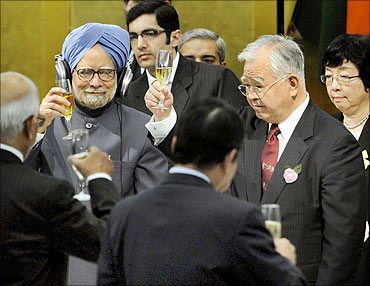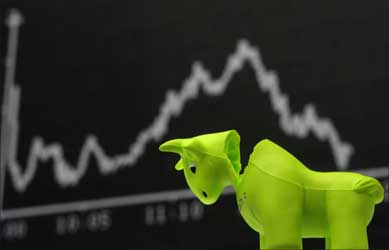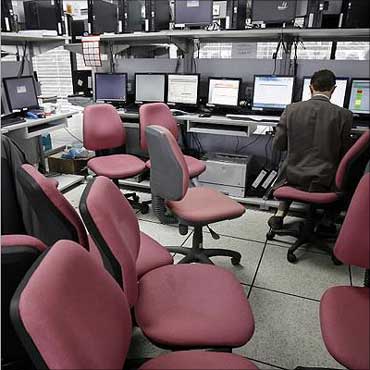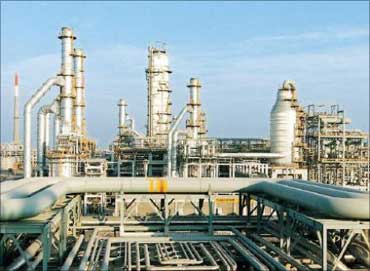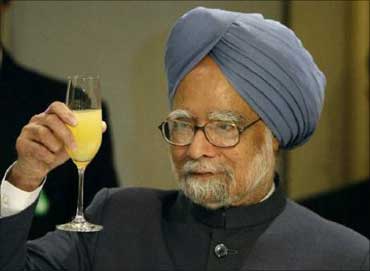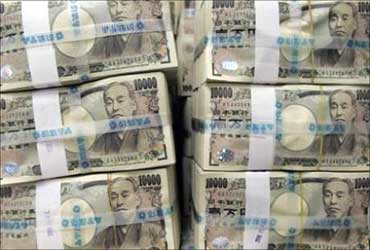 | « Back to article | Print this article |
PM urges Japan to be part of India's growth story
Apart from the two expected economic accords between New Delhi and Tokyo -- the Comprehensive Economic Partnership Agreement and the easing of issuance of visas to Japanese visiting India -- no major trade or investment announcement has yet been made during Prime Minister Manmohan Singh's visit to Japan.
Negotiations on the Comprehensive Economic Partnership Agreement were initiated four years ago in the backdrop of India's strong belief that the two Asian majors must work together to create a business environment conducive to much greater two-way trade and investment flows.
Earlier, the prime minister addressed a business luncheon hosted by Nippon Keidanren in Tokyo on Monday.
The prime minister said that while many nations shook from stem to stern due to the economic recession which was the worst crisis since the Great Depression of the 1930s, India was relatively less affected.
Click on NEXT to read more...
PM urges Japan to be part of India's growth story
True, given the severity of the crisis, it was inevitable that India too would be affected; its economy slowed down from the 9 per cent growth rate it had achieved in the four years before the crisis of 2008 to 6.5 per cent in 2008-09.
However, New Delhi responded with concerted measures to revive and sustain economic growth through a range of fiscal and monetary policies, the prime minister told the leaders of industry.
"I am happy to report that as a result our growth recovered to 7.4 per cent in 2009-10 and is now projected to be 8.5 per cent in the current fiscal year that is 2010-11. It is my expectation that we will return to a 9 per cent growth path in 2011-12," he said.
Given the robustness of the Indian economy, the prime minister said that it makes eminent sense in investing in the country.
Click on NEXT to read more...
PM urges Japan to be part of India's growth story
FDI and mergers and acquisitions
During the time that the negotiations were on to get the CEPA ready, Japanese foreign direct investment in India grew substantially.
"Much of this (FDI) has been due to mergers and acquisitions," Dr Singh said on Monday while addressing top Japanese and Indian industry captains.
The prime minister said that greater Japanese participation in the Indian industry through FDI was very welcome, so that new capacities are created in India in its manufacturing and infrastructure sectors and allows for freer flow of high-end technologies.
During the last three years India has received cumulative FDI worth over $100 billion. And although there has been a slowdown in recent months, the prime minister said: "I see that as being temporary."
Click on NEXT to read more...
PM urges Japan to be part of India's growth story
Infrastructure
India's infrastructure deficit poses a major constraint on manufacturing growth and can adversely impact FDI flows.
During India's next Five-Year Plan from 2012 to 2017, India envisages financial outlays of over $1 trillion on infrastructure projects.
Private investment will play a large role in achieving this target and India welcomes a much greater role by Japanese industry in the development of economic infrastructure in India, the prime minister said.
Dwelling on the mega Delhi-Mumbai Industrial Corridor project, the prime minister said that Japan is the partner of choice for the project that covers a length of over 1,480 km across six Indian states.
The DMIC project has the potential to become the hub of India's new bilateral economic engagement in the area of manufacturing. Some of the notified investment regions are almost the size of Singapore in terms of their area.
"We welcome in particular the involvement of Japanese companies in the development of 'smart communities' in the DMIC area," the prime minister said.
Click on NEXT to read more...
PM urges Japan to be part of India's growth story
Information technology
Also, during the time the CEPA was being negotiated, Japanese business doubled its presence in India.
Globally, India has been a tremendous success in the field of information technology and its prowess in the services sector and the knowledge economy are well recognised and documented.
Many an American and European company has tasted big success and drawn major benefits through collaboration with Indian IT companies.
The prime minister expects that Japanese companies too will "take advantage of these opportunities to enhance their efficiency and competitiveness through expanded partnerships with India's IT sector".
Click on NEXT to read more...
PM urges Japan to be part of India's growth story
Pharmaceuticals
The CEPA will also create newer opportunities for India's pharmaceutical industry in the Japanese market, helping to meet Japan's growing demand for high quality and relatively inexpensive generic medicines, the prime minister said.
Click on NEXT to read more...
PM urges Japan to be part of India's growth story
Energy
With India's brisk economic growth, the demand for energy has been rising rapidly. Japan, as a global leader in energy-efficient technologies, can play a significant role in helping India meet its voracious energy needs in an environmentally friendly manner.
India, said the prime minister, seeks Japanese technology and investment in conventional as well as new and renewable energy.
He said that "nuclear energy can provide our growing economy with a clean and efficient source of power. Cooperation in this area will enable Japanese companies to participate in India's ambitious nuclear energy programme."
Click on NEXT to read more...
PM urges Japan to be part of India's growth story
Economic power shifting towards Asia
Dr Singh said that the weight of global economic power is shifting inexorably towards Asia, and irrespective of the current slowdown, Japan will remain Asia's most advanced industrialised nation for decades to come. He said that it will also continue to exert considerable influence on the global economy.
India is participating fully in the rising tide of economic expansion in Asia. The prime minister said that it is his hope that India and Japan will continue to work together for the creation of a broader Asian Economic Community.
"Japan must be an important partner in India's economic development and transformation. Together we can contribute to global stability, prosperity and development," he said.
"I sense a new enthusiasm and a vibrancy that gives me reason to believe that my long-held vision will be realised. I invite you to repose your faith in India," the prime minister urged Japanese business leaders.
"I assure you that we will spare no effort to make Japanese business welcome. Together, we can ensure the long term prosperity of our two peoples for the greater benefit of countries in our region and the world," he reiterated.
"I am confident that the strong fundamentals of the Indian economy will enable us to achieve our objective of double-digit growth in the coming years," he said.
India is determined to continue the process of economic reforms that will create a favourable investment environment and facilitate higher investment flows, Dr Singh asserted.
Click on NEXT to read more...
PM urges Japan to be part of India's growth story
Praise for Japan
Japan has always been viewed with great admiration by the people of India, the prime minister said.
"The government and the people of India deeply appreciate the generous assistance which Japan has provided to us for building economic and social infrastructure."
India has been the largest recipient of Japanese Official Development Assistance since 2003. The Delhi Metro project has been followed by ODA assistance for other Metro projects in Kolkata, Bengaluru and Chennai.
The Dedicated Freight Corridor project between Delhi and Mumbai, launched with Japanese ODA support, is designed to transform India's freight logistics.
The prime minister is on a three-nation tour to Japan, Malaysia and Vietnam that ends on October 30.
